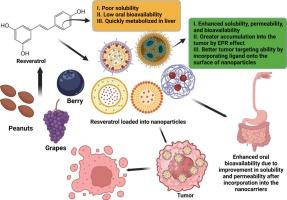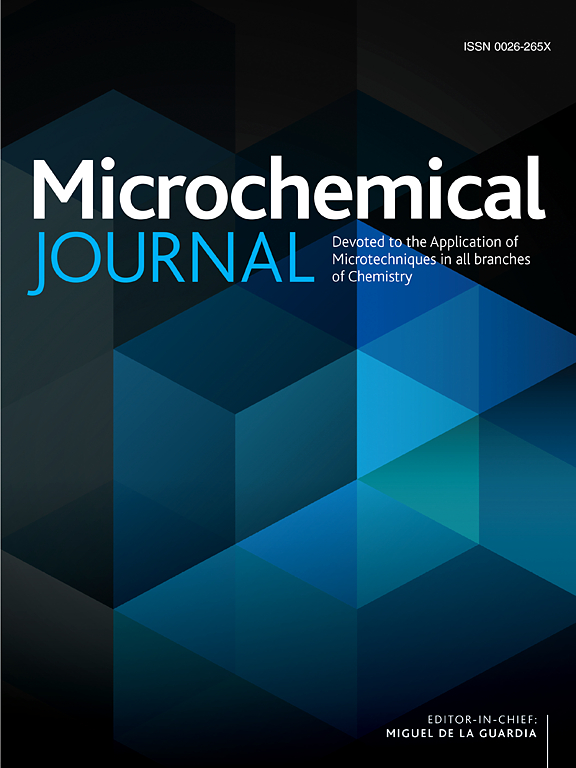白藜芦醇的智能纳米颗粒输送系统:提高抗癌功效和生物利用度的有针对性的策略
IF 4.9
2区 化学
Q1 CHEMISTRY, ANALYTICAL
引用次数: 0
摘要
由于不受控制的细胞增殖、转移和对标准化疗药物的耐药性,癌症仍然是全球死亡的主要原因。白藜芦醇(Resveratrol, RSV)是一种天然存在的多酚类化合物,通过调节细胞凋亡、血管生成和氧化应激等多种信号通路,显示出强大的抗癌潜力。然而,由于其水溶性差、代谢快和有限的全身生物利用度,其临床转化受到阻碍。基于智能纳米颗粒的给药系统已经成为克服这些限制的一种变革性策略,通过被动增强渗透性和保留效应(EPR效应)和主动配体介导的机制,增强肿瘤积累、控制释放和选择性靶向。本文综述了装载rsv的纳米载体的最新进展,如聚合纳米颗粒、固体脂质纳米颗粒、纳米结构脂质载体和刺激反应平台,用于各种癌症模型,包括结直肠癌、肺癌、胶质母细胞瘤和黑色素瘤。特别关注其物理化学优化,在逆转多药耐药,最小化全身毒性以及与常规抗癌药物共同递送方面的作用。综述还概述了基于rsv的智能纳米医学在精确肿瘤学应用中的转化挑战、临床前景和未来方向。本文章由计算机程序翻译,如有差异,请以英文原文为准。

Smart nanoparticle delivery systems for resveratrol: A targeted strategy to enhance anticancer efficacy and bioavailability
Cancer remains a primary contributor to global mortality, driven by uncontrolled cell proliferation, metastasis, and resistance to standard chemotherapeutics. Resveratrol (RSV), a naturally occurring polyphenolic compound, exhibits strong anticancer potential through modulation of multiple signaling pathways including apoptosis, angiogenesis, and oxidative stress. However, its clinical translation is hampered by poor aqueous solubility, rapid metabolism, and limited systemic bioavailability. Smart nanoparticle-based delivery systems have emerged as a transformative strategy to overcome these limitations, enabling enhanced tumor accumulation, controlled release, and selective targeting via passive Enhanced Permeability and Retention effect (EPR effect) and active ligand-mediated mechanisms. This review critically summarizes recent advancements in RSV-loaded nanocarriers such as polymeric nanoparticles, solid lipid nanoparticles, nanostructured lipid carriers, and stimuli-responsive platforms used across diverse cancer models including colorectal, pulmonary, glioblastoma, and melanoma. Special focus is given to their physicochemical optimization, role in reversing multidrug resistance, minimizing systemic toxicity, and enabling co-delivery with conventional anticancer drugs. The review also outlines translational challenges, clinical outlook, and the future direction of RSV-based smart nanomedicine for precision oncology applications.
求助全文
通过发布文献求助,成功后即可免费获取论文全文。
去求助
来源期刊

Microchemical Journal
化学-分析化学
CiteScore
8.70
自引率
8.30%
发文量
1131
审稿时长
1.9 months
期刊介绍:
The Microchemical Journal is a peer reviewed journal devoted to all aspects and phases of analytical chemistry and chemical analysis. The Microchemical Journal publishes articles which are at the forefront of modern analytical chemistry and cover innovations in the techniques to the finest possible limits. This includes fundamental aspects, instrumentation, new developments, innovative and novel methods and applications including environmental and clinical field.
Traditional classical analytical methods such as spectrophotometry and titrimetry as well as established instrumentation methods such as flame and graphite furnace atomic absorption spectrometry, gas chromatography, and modified glassy or carbon electrode electrochemical methods will be considered, provided they show significant improvements and novelty compared to the established methods.
 求助内容:
求助内容: 应助结果提醒方式:
应助结果提醒方式:


